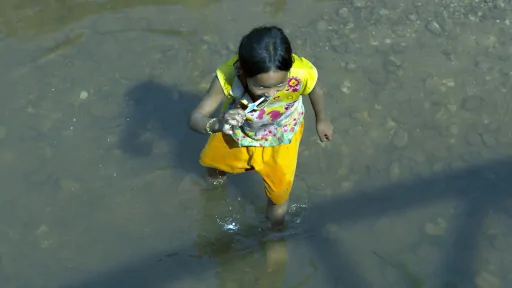Opinion Editorial Archive April, 2021: Shifting Baseline Syndrome

What does the World Meteorological Organization have to do with the question of whether the British Royal Family is racist? A lot.
Last month, we saw three examples of how the very idea of what's "normal" changes over time. The group of nominees that was announced for this month's Academy Awards is the most diverse and inclusive ever. An indigenous person (Deb Haaland) is now the most senior figure for governance of indigenous land. Geological features on Mars are being given names in the Navajo language. And these are all examples from only one country — the United States.
A fourth example can be seen in this month's photo, which I took recently in a remote village in Laos. This young, indigenous Akha girl considers it normal to brush her teeth, but it's very unlikely that her parents did at her age. It may even be normal, when she eventually has children of her own, to brush her teeth with running water instead of standing in a stream.
To the extent that we assimilate such changes into our everyday narratives, we are experiencing Shifting Baseline Syndrome. Researchers have documented multiple examples across multiple scenarios showing how we base our notion of what is normal primarily on our own life experiences instead of a trans-generational timeframe.
This syndrome is, quantitatively, an extension of the recency effect, but it is qualitatively much different. That difference can be seen, for example, in Europe right now. Some countries there have a surprisingly high incidence of general Covid-19 vaccine hesitancy. One reason underlying this general hesitancy is also found elsewhere: Everyone in the world has a lifetime baseline confirming that safe, effective vaccines are not developed in just one year. For our children, the same baseline will confirm that a year is normal; for our grandchildren, that baseline will have shifted such that a year will seem like a long time to develop safe, effective vaccines.
But, as recently as last month, some European governments (joined a few days ago by Canada) demonstrated a different kind of hesitancy that is not a baseline. That is a hesitancy to base policy on science. Hence a recency effect in Europe that the AstraZeneca vaccine specifically is not safe for a particular age group (but there is no reliable way to know which age group that is). Recency effects last far shorter than any generation. So, we can predict that the AstraZeneca vaccine will eventually be administered more widely in Europe.
There is almost certainly an evolutionary advantage conferred by the recency effect. If someone from your village was killed yesterday by a wild animal while gathering food in area X, but nobody has been similarly killed for a long time in area Y, your best bet is more likely to be gathering food in area Y today. (Assuming that wild animals do not choose their hunting grounds on an entirely random basis.)
In contrast, it is difficult to see how Shifting Baseline Syndrome would be naturally selected. In fact, the opposite is more likely to be the case. Even for common, normally distributed events, observation outcomes are more likely to regress toward the mean in large sample sizes. For rare events, the sample size can only be large enough for regression toward the mean across a multi-generational time span. This becomes especially important for very rare but potentially catastrophic events. We saw this last month with the volcanic eruption on Mount Fagradalsfjall in Iceland.
To the extent that a people preserves its knowledge trans-generationally, then, we would predict that same people to be more likely to survive. It is no surprise, therefore, that the longest-surviving peoples are indigenous peoples.
Conversely, it is also no surprise that a poll in the United Kingdom last month showed a stark contrast between a younger and an older demographic, with younger people far more likely to hold the opinion that Harry and Meghan have been treated unfairly by the British Royal Family. Their baseline for racial justice has shifted from that of their parents.
If a poll were taken among the indigenous population of any former British colony on the question of whether the British Monarchy is a racist institution, I think we know what the overwhelming opinion would be across all age groups. Yet, a shifting baseline was necessary before last month and after sixty-four years: Wheaton College, in the United States, removed from display a plaque describing indigenous people as "savages."
Returning to our first three examples, diversity and inclusion did not begin among indigenous societies just last month. In the absence of Shifting Baseline Syndrome, the idea that an indigenous person be in charge of indigenous land is completely normal in the United States — the situation has simply regressed toward the true mean when measured on a long enough timeline. And the Navajo today continue to refer to geological features in their own language in everyday conversation.
What does all this have to do with the World Meteorological Organization? Depending on where you live, your weather may change dramatically after this month. Or, rather, your perception of it may change. Almost a hundred years ago, the WMO instituted Shifting Baseline Syndrome into weather forecasting. For every decade since, "average" numbers for variables like rainfall and temperature have been based on actual measurements taken in the most recent 30-year period. For the past decade, that has meant measurements taken between 1981 and 2010. Beginning next month, those same "averages" will be based on 1991-2020 readings.
Although we cannot forecast who will replace Petteri Taalas as WMO Secretary-General in 2024, we can live in hope that it will be an indigenous person.
If you enjoyed reading this month's opinion editorial, please consider supporting independent, advertising-free journalism by buying us a coffee to help us cover the cost of hosting our web site. Please click on the link or scan the QR code. Thanks!

